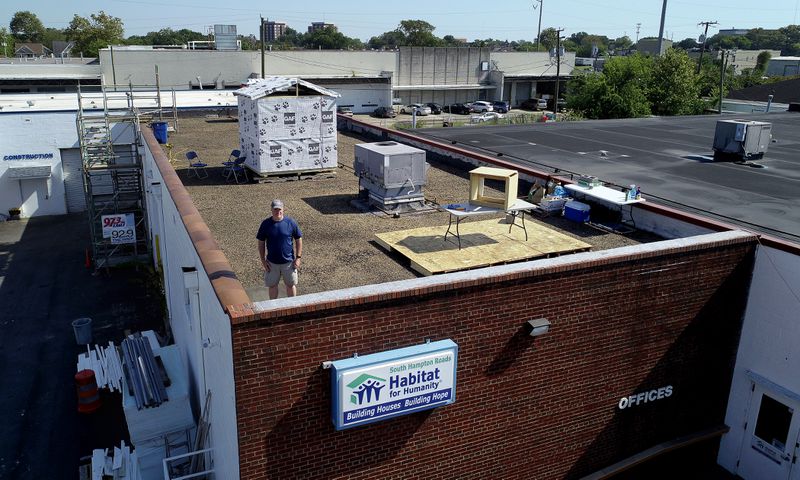OUTLET: The Virginian-Pilot
Frank Hruska worked his job as usual Tuesday.
As executive director of Habitat for Humanity South Hampton Roads, he responded to emails and wrote thank yous for donors.
But whenever he needed something, such as the mail, he used a rudimentary pulley system with a bucket to get it from staff. And when anyone wanted to talk face to face, they walked up temporary stairs built into scaffolding.
Hruska, 56, has been camped out on the building’s roof since Sunday.
He’s on a weeklong journey to raise money for the nonprofit to install solar panels on the roof.
The panels are “a win-win for everyone involved,” Hruska said. He was sitting in a plastic chair while cars whizzed past the busy intersection of Tidewater Drive and Princess Anne Road two stories below. “As we go forward, we’re going to add more and more savings not only to our pocket but to the environment.”
Habitat for Humanity already has an investor to pay for the panels. The problem is the roof itself. It needs a quarter-million dollars in renovations to accommodate the technology.
Hruska said the idea for the living-on-the-roof fundraiser came to him in the middle of the night a while back. He emailed staff the next morning and — to his surprise — they were on board.
After months of planning, he went up on the roof around noon. The roof is flat and covered in gravel.
Habitat for Humanity in Norfolk is trying to convert its headquarters green by installing solar panels. To draw attention and raise the money, the nonprofit’s director, Frank Hruska, has pledged to live on the building’s roof for a week. As seen Tuesday, September 28, 2021.
Habitat for Humanity in Norfolk is trying to convert its headquarters green by installing solar panels. To draw attention and raise the money, the nonprofit’s director, Frank Hruska, has pledged to live on the building’s roof for a week. As seen Tuesday, September 28, 2021. (Stephen M. Katz/The Virginian-Pilot)
In the mornings he walks about 30 laps around the roof’s edge.
During the day, Hruska works on his laptop — he ran an ethernet cable to the roof — in between conversations with local officials and organizations about helping the environment, including a visit by Virginia Beach Mayor Bobby Dyer. Hruska broadcasts the chats live on Facebook.
At night, he brushes his teeth and sleeps in a sleeping bag. The first night, he slept under the stars.
By Monday, the sun proved too brutal.
“I was as red as a lobster,” Hruska said.
Volunteers came that morning and constructed a small shed where Hruska can catch some shade and work without laptop glare. He sleeps in there now with only a flashlight and electronics for light at night.
A cooler stores plenty of water and snacks, next to a few bags of clothes. Without access to a shower, he’s been cleaning himself with baby wipes. There is, however, a port-a-potty on the roof.
Local restaurants — including No Frill Bar and Grill, Redwood Smoke Shack and Ynot Italian — have donated meals.
By Tuesday, the stunt had raised more than $52,000.
Habitat for Humanity was first approached about solar panels by Ruth Amundsen, a NASA engineer who runs a company called Norfolk Solar to help people install the panels at no upfront cost. Funds like hers pay for the installation and make their money back through payments by the homeowner or business that come out of energy bill savings. The investor also gets tax credits.
It was a “no-brainer,” Hruska said.
Habitat ended up finding its own investor, but the process is the same. After the nonprofit spends $250,000 to upgrade the roof, the investor will pay $150,000 to install the solar panels.
Hruska said Habitat expects to pay that back, interest-free, through energy savings within five years. The nonprofit currently pays about $18,000 per year in utility bills.
Roofs have become a big challenge for installing solar, particularly for older buildings, Amundsen said.
Needed renovations stymied projects for many churches and businesses she’s approached in Norfolk in recent years — including at O’Connor Brewing, which had been excited to go solar and even planned a themed beer, she said.
A program recently authorized in Norfolk called Commercial Property Assessed Clean Energy should help by including roof renovations in available financing, she said.
Hruska said he hopes Habitat’s future energy savings will allow more money to be spent building homes.
This week, camped out on the roof, he has a newfound appreciation of the organization’s mission to provide shelter.
Katherine Hafner, 757-222-5208, katherine.hafner@pilotonline.com

